Music production is getting popular every day. A lot of people are getting into producing their own music whether it would be electronic dance music, rap, or even rock music. Some people struggle with it or doing the wrong things. Here are five music production tips to help you improve your music.
1. Don't Buy Something Because Someone Else Has It
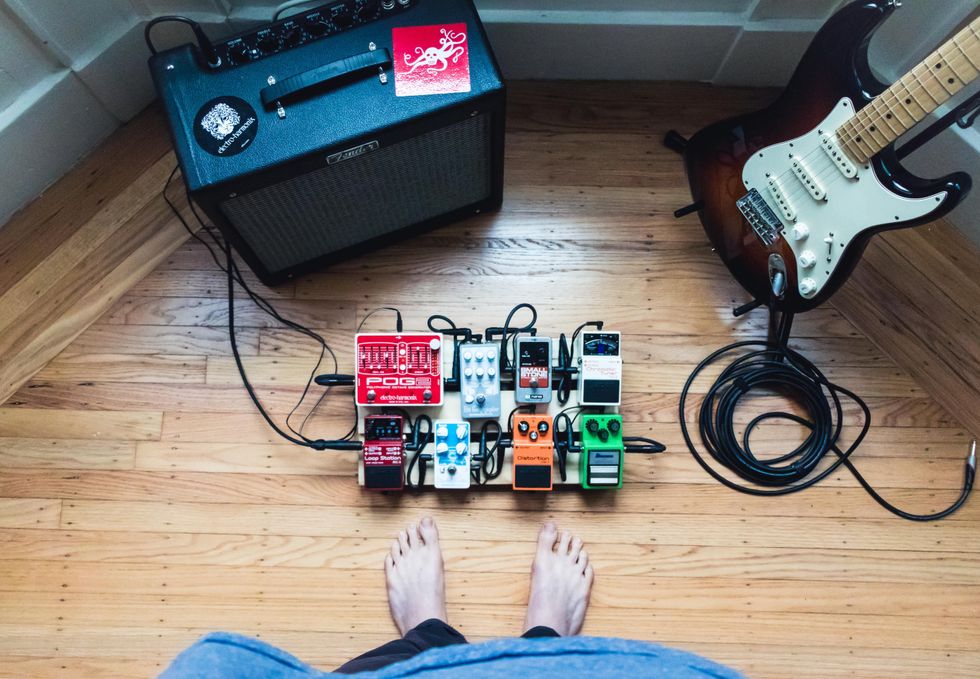
Michael Henry, Unsplash
First and foremost, do not spend more than you can afford. Just because Martin Garrix has it does not mean you should buy it as well. I met people who had bought the most expensive keyboard they could find at Guitar Center and find out that they have no idea how to play the piano. Let alone, never use it, but use it for show so they could post it on Instagram. Additionally, I know people who bought KRK Rokit studio monitors and barely use them. They would use headphones to create their music and I think to myself, why would you buy something and never use it? Their answers are not at all that surprising. They bought it just because they searched for the best studio monitors ever and that other professional producers use them. I wrote an article about the misconceptions of DJing and one of the topics that I talked about was equipment. Sometimes you just do not need certain things. For me, I use Mackie CR3's which are significantly cheaper and can get the job done. I do not use a keyboard unless I have to, I do not have an audio interface, I do not use a sub-woofer, or even a fancy mouse. All I use is my laptop, a cheap Logitech mouse, and monitors that will do the job for me. If it can get the job done, it is all that matters. Do not buy a big keyboard because Armin Van Buuren uses one.
2. EQ Frequencies That Are Not Needed
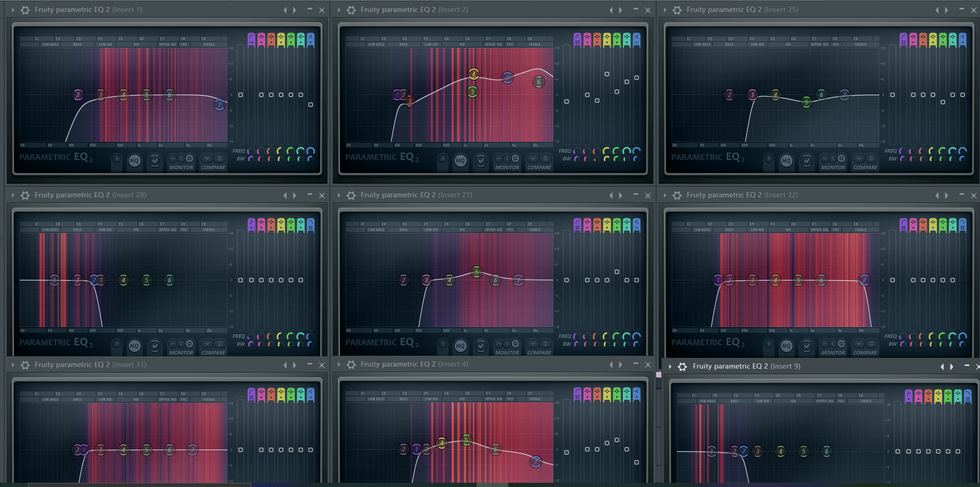
Peter Truong
This is the biggest thing that I have noticed among a lot of producers, especially producers that are brand new to music production. There would be a clap sample that would have low frequencies and it would clash with the kick or bass. If you do not do it, it can mess with your mix. Especially if you are mastering and you throw in an iZotope Ozone 9 with some dynamics and built in equalizer. All of a sudden, you hear a bunch of things that you never heard beforehand, it becomes a huge problem. Whatever sample you use, make sure you equalize things that are not needed. For instance, if you throw in a closed hi-hat sample, you better cut off most of the low frequencies. Furthermore, when you cut certain frequencies, you make room for other frequencies. If you have a synthesizer and working with a big saw sound, cut some of the low frequencies to make room for the bass line that is going to contain a significant amount of low frequencies. By not cutting things out, frequencies will clash and your mix is going to sound super muddy. If you think that your mix is fine, but other people do not think so, then you need to take a step back and actually listen to them so that it does not sound as bothersome to people. Some of these subtle changes can make a huge difference for your mix. This producer showed me one of his tracks that he was working on and what I noticed in the background was this little low frequency that sounded like a bass line, except it was not a bass line. Then when there came big low frequencies like the kick and a bass guitar, they did not sound as prominent. What had happened was that low frequency that meant nothing to the song was drowning out other important low frequencies like the kick. As soon as he equalized out the low frequencies which was coming from the microphone that he was recording with, all the other sounds became more prominent. It is important to always cut, especially when mastering a track. I cut out 30 hz because there are certain frequencies you do not need.
3. Head Room

FabFilter
This is another big thing that I noticed with a lot of new producers, and yes, even the more experienced producers. What I notice in a lot of tracks is that people think when they make a song is that it needs to be loud. So what they do is they do not turn down certain things because to them they need it to sound loud. That is very wrong because there is a thing called digital clipping which is audio that is distorted because it is pushing the sound to the max. To avoid this is by giving your mix head room. What I mean is, you need to have a safety zone, ideally have the entire track to be negative four to negative six decibels. Anything that goes above zero decibels is a never good because you are going above what is necessary and your song will clip. When you give your track head room, it gives you more opportunity to work with in the master channel. Especially if you are throwing in a plugin that is going to give it more dynamic range or even a limiter, it is going to make your mix a lot better and more full than you think. Especially with a limiter, it makes your song a lot louder than before. The way a limiter works is you have this overall sound and making it louder without it having digital clipping. Keep in mind, you cannot just turn up the limiter gain to the max, as it will be distorted significantly which is bad for obvious reasons. Plus, you need to make room to give your track some dynamic range. Dynamic range first, equalize, and then throw in a limiter.
4. Be Yourself
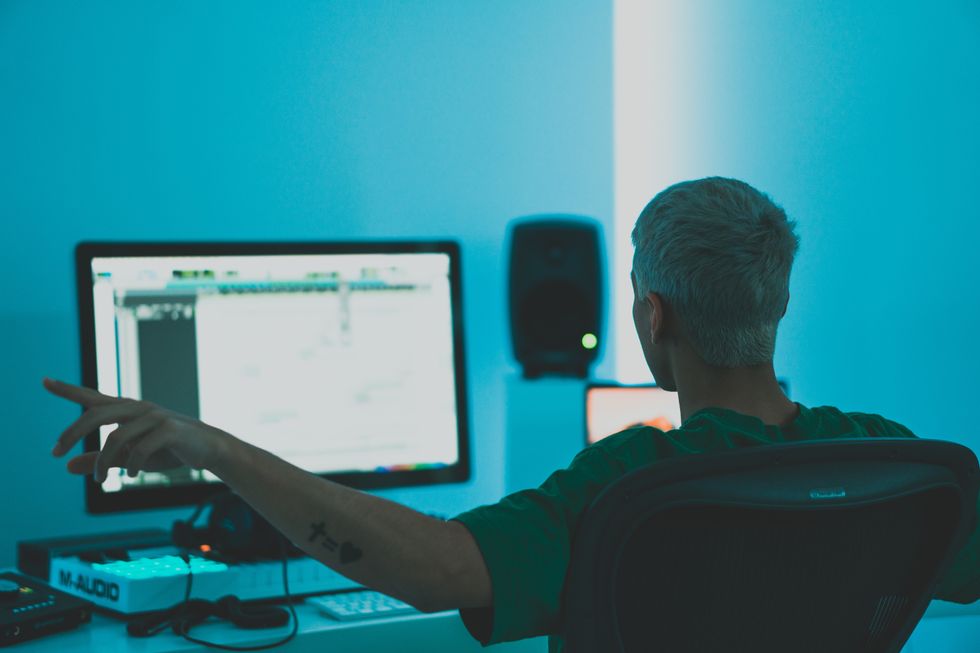
Andreas Forsberg, Unsplash
Stop copying the styles of producers. It is already been created by someone, so stop copying them. Imagine a world of songs that have the same beat structure as "Bad and Boujee" by Migos and Lil Uzi Vert. It gets boring. Unfortunately, a lot of songs are similar to each other and it just lacks creativity. It takes the fun out of producing and it takes the fun out of listening to music. If you like using a bunch of random sounds like jungle noises, by all means go for it. Who cares if one person thinks it sucks, other people might like it. It makes you stand out and have a voice. If you be yourself, it becomes a lot more fun rather than trying to live up to someone. I am sorry, but there are a handful producers that sound extremely similar to other big producers. If it is by accident, that is fine, it is pretty common when it comes to electronic dance music. However, if it is intentional, just stop and reconsider what you are doing. If you are in the music industry for the money and fame, leave. I do not care who you are. Music helps most of us to express ourselves in creative ways. If you are copying someone and trying to get what they have, leave because in the long run, you might face a lawsuit.
5. Experiment With Plugins
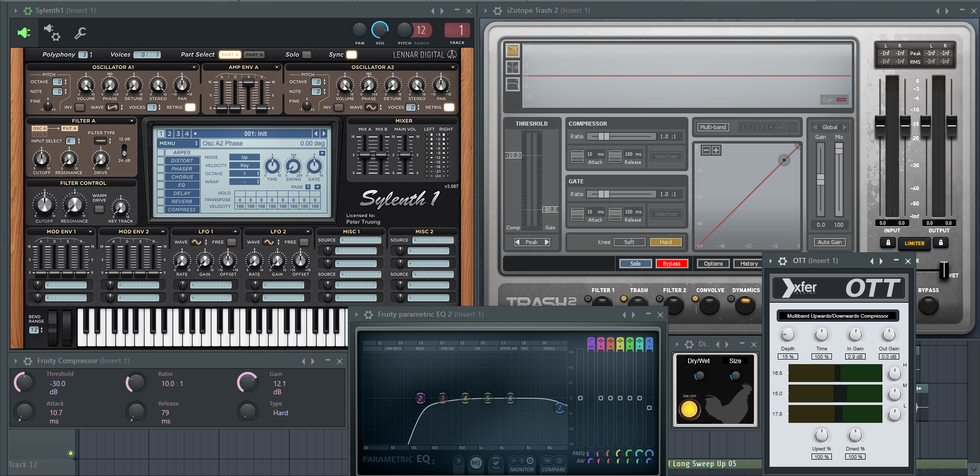
Peter Truong
It is fine to use synth patches once in a while, but creating your own makes you stand out even more. If you have a lot of plugins sitting there, use them and play around with them because you have no idea what it can give you. For instance, I used the plugin Sylenth1 and used the initial sound it gives you with a basic saw. Then I threw in an iZotope Trash 2 with reverb, a compressor, the Focus One plugin, and other plugins. All of a sudden I got a brand new sound that sounds nothing like the initial sound. Eventually, I used that sound as the base of my track which worked out for the best. For one of my tracks, I took an acoustic kick drum and threw in a compressor to make the kick as phat as possible. In addition with that, I threw in random things and experimented with them in order to give me a brand new kick that I eventually used in the track, a big room track. You have no idea what you are going to get, so it is important to experiment with plugins because you will be surprised on what it can give you.
Bonus - Take Breaks
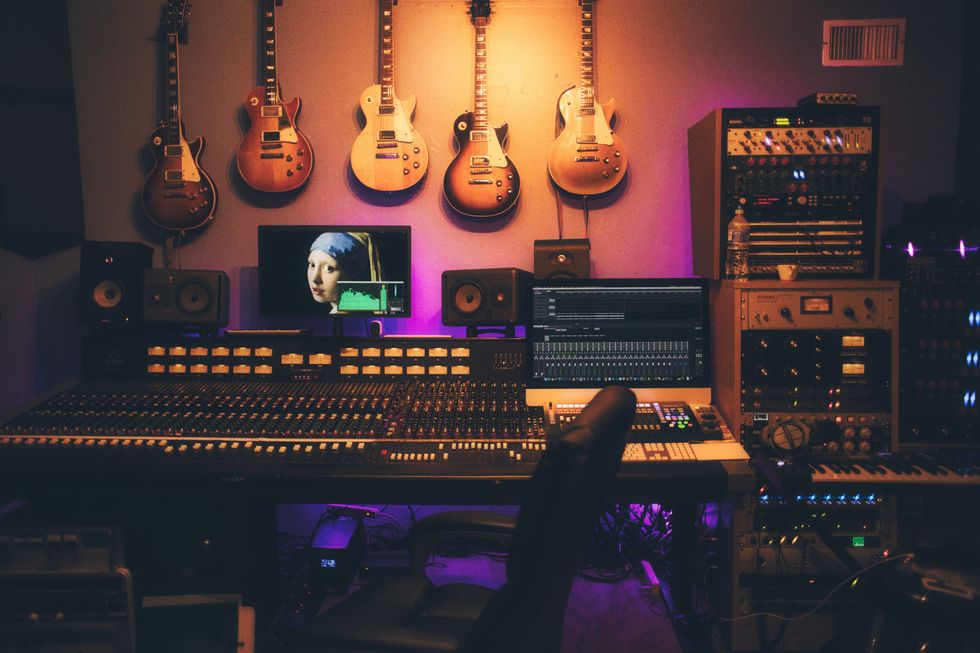
Caught In Joy, Unsplash
Taking breaks is very essential for any type of work. Not a thirty second break, I am talking about even a day. Taking a break has many benefits for musicians. There is such a thing as writers block and based on my experience and others, it can be draining. For me, I go insane and freak out. If you take a break and step away, you can get an idea eventually. An idea will come out of no where and it is all because you took a break. People say if you are drained from what you are doing, you are not passionate about it. That is very false, you can feel drained by anything and it is completely fine to take a break every once in a while. It does not show that you are lazy or unmotivated, it can for some, but it is not always the case. Whenever I am done with a track, especially since it is not mastered, I do not open the project or listen to any music for at least a day. This gives me a fresh set of ears to work with. Even then after the track is mastered for the first time, I take a full week off of working on music so that way I notice different things when I open the project a week later and possibly make changes if necessary. If you need to take a break, take a break. It benefits your mental health very much.
Hopefully these tips are helpful to any of you. It might be basic information to some, but they are extremely helpful tips that a lot of people forget or do not do. Feel free to contact me for any help with music production or need a listener to help with your music.
- How To Stay Creative And Inspired As A Music Producer? ›
- 5 Tips To Build Credibility As A Music Producer ›
- Why Music Producers Deserve More Recognition ›


















